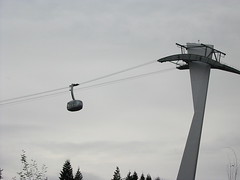Over-Hopped, Over-Hyped
by Steve, July 31st, 2007If you read the Portland bloggers over at metblogs, you might get a somewhat skewed view of Portland. For example, you might think that we’re all a bunch of whiteys who love football, shiny transportation toys, street fairs, dogs, and beer. (Actually, that view might not be so skewed. But I digress.)
Oh, the beer. Any Portland booze hound will happily tell you that Portland has more breweries than any other metro area in the U.S. This is beervana, people. This past weekend was the annual Oregon Brewers’ Festival down at Waterfront Park. It’s basically a giant keg party. This year, Mayor Tom Potter got things started by leading a parade through town and tapping the first keg.
People get really excited about lining up to drink beer from little plastic mugs that they get to take home and line up on a shelf with mugs from past booze fests.
But here’s the thing about Portland “craft” beer (they had to stop calling it micro-brew because so many of the micro-breweries went macro a long time ago): it is freaking horrible tasting.
Now before anybody jumps on me as some kind of Budweiser drinking know-nothing, let me give you some background. I love a good European beer. I’ve drunk Paulaner in Munich and Pilsner in Plzeň. I even had a “real” Budweiser in České Budějovice. I love Chimay, though I can’t drink it anymore because I always end up in a lovers’ spat when I do.
I moved to Portland in 1989 and was really excited about the micro-brew thing. My first job here was in a one of the McMenamin’s brew-pubs. But it didn’t take long to burn out on the stuff. First off, McMenamin’s beer was notoriously skanky, with bad yeast and poor quality control (they’ve always been known more for their venues than their food or beer anyway). Their beer got better when they invested in some larger-scale brewery equipment, but it’s never been their forte. But even the finer brewers in town suffer from one common affliction.
Over-hopping.
Virtually every single beer I’ve tasted from Portland is so over-hopped as to be nearly undrinkable. Fans of this kind of beer, who have evidently never experienced the nuanced hopping of European beers, are quick to dismiss people who gag on local brews as fans of weak mainstream American beers.
But beer isn’t supposed to taste like this. It’s not supposed to have a bitter, sticky finish, and it’s not supposed to make you feel drowsy after a pint. Maybe it’s because we actually grow hops in the Willamette valley that brewers here feel inclined to over-hop. Or maybe they just don’t have the refined palette of European brewers.
Whatever. I never touch the stuff anymore. On the rare occasions I drink beer, it’s generally PBR, Pacifico, or Bohemia, any of which taste closer to a fine European lager than anything you can find from a “craft” brewery in Portland. (You want to see a Portland beer snob lose his mind? Tell him what a fine lager PBR is. Hey, it’s union-made, and you know I’m all for that.)






